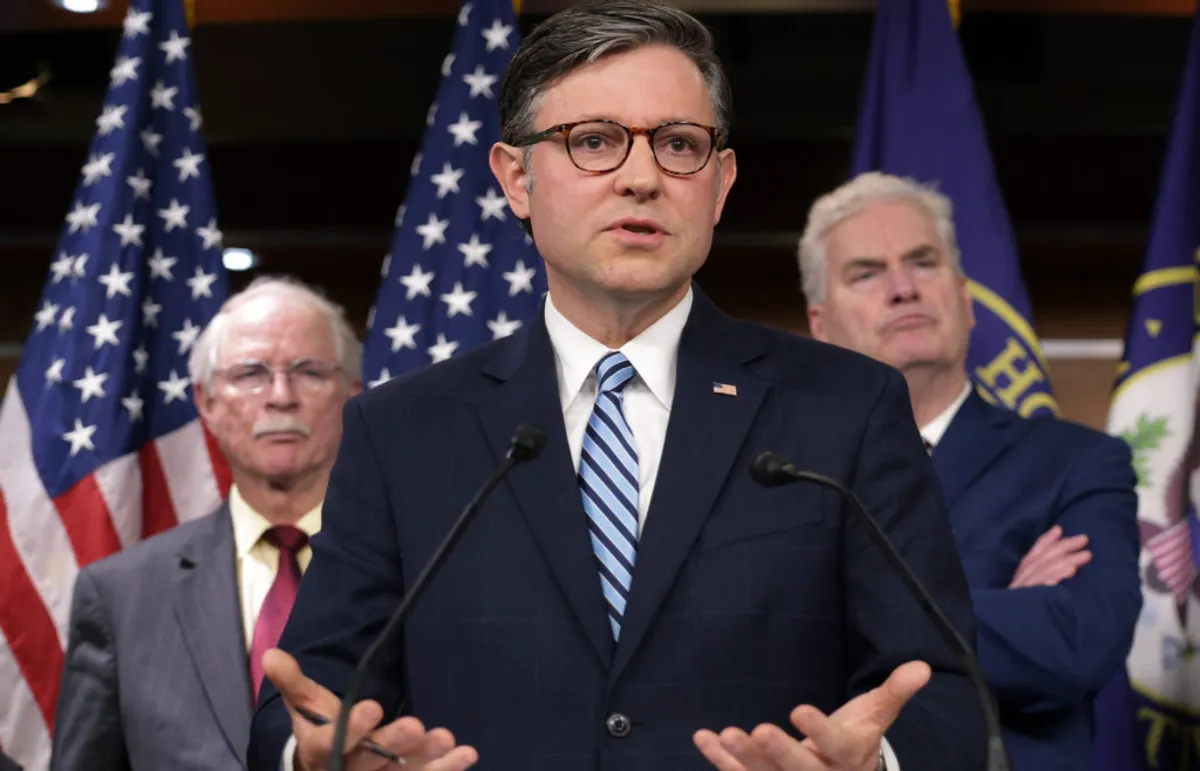
In a significant blow to House Republicans, their ambitious package of tax breaks and spending cuts was unable to pass through the Budget Committee on Friday. This came as a surprise when a group of conservative lawmakers joined all Democrats in a crucial vote against the proposal, leading to a final tally of 16-21. The hard-right faction is demanding deeper spending cuts to programs like Medicaid and a revision of the Biden-era green energy tax breaks before they will lend their support to President Donald Trump’s so-called “beautiful” bill. The conservatives are warning that the proposed tax cuts could exacerbate the nation’s staggering $36 trillion debt.
The failed vote stalls House Speaker Mike Johnson’s goal of getting the package approved by next week. However, the holdout lawmakers have committed to negotiating over the weekend as President Trump returns to Washington from his trip to the Middle East. “Something needs to change or you’re not going to get my support,” stated Rep. Chip Roy, R-Texas, highlighting the tensions within the party.
The One Big Beautiful Bill Act, encompassing an extensive 1,116 pages, is at a pivotal juncture. The conservative faction is pushing for steeper cuts to Medicaid and other social programs to balance out the costs associated with the proposed tax breaks. Meanwhile, lawmakers from high-tax states like New York are advocating for an expanded SALT deduction (state and local tax deduction) for their constituents, which could significantly increase the overall cost of the package.
While Speaker Johnson maintains that the Republicans are poised to pass the bill, claiming it will provide economic stability, Democrats have been vocal in their criticism. They argue that the legislation would strip health coverage from millions while offering substantial tax cuts to the wealthiest Americans, ultimately leading to increased future deficits. Rep. Brendan Boyle, the top Democratic lawmaker on the panel, denounced the proposed changes, calling them “bad economics” and “unconscionable.”
The Budget Committee serves as one of the final checkpoints before the bill reaches the full House floor for a vote, anticipated as early as next week. Typically, this committee handles administrative tasks, compiling work from various committees involved in developing the bill. However, the recent meeting turned out to be a turning point due to the slim Republican majority in the House, which leaves little room for dissent. Four Republican conservatives initially voted against the package, including Roy, Rep. Ralph Norman of South Carolina, Josh Brecheen of Oklahoma, and Rep. Andrew Clyde of Georgia. Eventually, Rep. Lloyd Smucker of Pennsylvania also changed his vote to no.
The conservative members of the Freedom Caucus are adamant about implementing stricter cuts, particularly targeting Medicaid. They are insisting on immediate work requirements for aid recipients, rather than the proposed starting date of January 1, 2029. Roy emphasized concerns about the legislation, stating, “We are writing checks we cannot cash, and our children are going to pay the price.”
On the other hand, New York lawmakers are relentless in their push for a more substantial SALT deduction than the $30,000 proposed for joint filers. They are advocating for a deduction of up to $62,000 for single filers and $124,000 for joint filers, which could inflate the package's costs significantly. With both conservatives and New Yorkers advocating for their respective priorities, Speaker Johnson faces the challenge of uniting the party to ensure the bill’s passage before Memorial Day.
The extensive package aims to extend existing income tax cuts established during Trump’s first term in 2017 while introducing new tax benefits promised during his 2024 campaign. Notable proposals include eliminating taxes on tips, overtime pay, and certain auto loans, which could provide relief for many taxpayers. Additionally, the bill proposes an increased standard deduction of $32,000 for joint filers and a temporary boost of $500 to the child tax credit, raising it to $2,500.
To counterbalance more than $5 million in potential lost revenue, the package suggests rolling back other tax incentives, particularly the green energy tax credits established under President Joe Biden’s Inflation Reduction Act. Some conservatives are advocating for an immediate end to these credits. Furthermore, the proposal seeks to slash over $1 trillion from health care and food assistance programs over the next decade by implementing work requirements for able-bodied adults. Changes to programs like the Supplemental Nutrition Assistance Program (SNAP) could result in at least 7.6 million fewer people having health insurance and a decrease of about 3 million monthly SNAP recipients.
In response to the proposed cuts, Democrats have voiced their concerns vehemently. Rep. Pramila Jayapal, D-Wash., mockingly referred to the bill as “one big, beautiful betrayal.” Rep. Morgan McGarvey pointed out the potential consequences of the legislation, stating, “To pay for it, kids in Kentucky will go hungry, nursing homes and hospitals will close, and millions of Americans will be kicked off their health insurance. It’s wrong.”